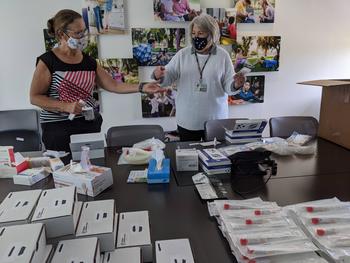In This Story
Since 2020, in large part due to the COVID-19 pandemic, an estimated 100,00 nurses have quit their jobs. By 2027, almost one-fifth of all registered nurses will have considered leaving the field, according to research. Nurses cite burnout and mental health stressors as the leading reasons for leaving. To safeguard nurses’ physical and mental health and improve nurse retention, employers must identify and address signs of mental health challenges before the next pandemic or public health crisis.

Researchers at the College of Public Health studied the physical and mental health impact of the pandemic on front-line nurses. Their research found that low energy, high fatigue, and increased alcohol use are linked to depression and may be used as warning signs that a nurse is struggling with their well-being. Knowing this can help employers identify nurses who need more support. There is good news from the study—nurses with depression were more likely to seek mental health counseling than those without depression.
Professor Amira Roess from the Department of Global Health, and from the School of Nursing Associate Professor Kathi Huddleston, Director of Research Operations Grace Lawrence, and Professor Cheryl Oetjen examined the relationship between depression, anxiety, energy, and fatigue as associated with sleep quality and the feeling of loneliness, among frontline working nurses who cared for COVID-19 patients.
“Despite the general consensus that the pandemic increased the mental health burden on nurses working with COVID-19 patients, there is a lack of literature that examines the association between energy and fatigue and depression. In future pandemics or disaster response, we need to know how to create support systems for nurses and other frontline workers to address their mental health needs.” said Roess, who is the e principal e investigator. Roess is co-first author with Tulay Soylu, an alum of the Mason PhD in Health Services Research and Master of Health Administration programs and current assistant professor of instruction at Temple University.

The interprofessional team collected the data in 2020 and in 2021 by meeting with nurses outdoors and in open garages to keep everyone safe.
“Depression, Anxiety, Energy, and Fatigue Among Nurses Who Cared for Patients During the COVID-19 Pandemic: A Cross-Sectional Study" was published in The Journal of Holistic Nursing in September 2023. Ali Boolani of Clarkson University and Alyssa Wilson, a Mason Master of Nutrition alum, were co-authors.
This research was funded by a GO Virginia grant. The grant sought to study the physical and mental health impact of COVID-19 on the workforce, especially among essential, front-line workers such as those in health care, first responder roles, education, and retail. Results will inform tailored stress management interventions and programs for front-line health care providers. Read more about the grant here.
